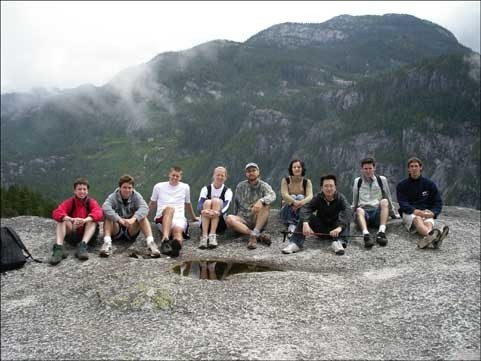When David Vocadlo sets out to climb Showcase Spire on Blackcomb next week he might not use a pre-planned route. Instead, he may try to find new grips and holds to gain a new route to the top.
Vocadlo, a chemical biologist and Simon Fraser University assistant professor, uses the same approach in research. For the past two and a half years his eight-person team of graduate and undergraduate students have been examining how human cells adapt to new situations, like being overloaded with sugars, or carbohydrates. By investigating how cells respond, how they sense nutrients and how they know when to secrete insulin, Vocadlo hopes the team’s research may ultimately lead to treatments for Alzheimer’s or Type II diabetes.
On July 25 the scientist, whose team project is funded through two national research councils and the Canadian Cystic Fibrosis Foundation, will present preliminary findings to an international conference in Whistler. The five-day International Carbohydrate Symposium has attracted almost 800 scientists from around the world, near a North American record for the conference held every two years. Arranged by the National Research Council and SFU’s chemistry department, conference organizers said they chose Whistler not only for its beauty, but for its design.
"Unlike in big cities, all the participants in Whistler are in the same area and don’t disappear into 20 different hotels miles apart," said Andrew Bennett, SFU’s chemistry department chair. Bennett said Whistler’s compact core encourages greater interaction amongst participants, arriving from as far as Africa, India, Asia, South and Central America and Europe. Bennett said the symposium is not likely to be held in Canada again for another 30 years.
Another hot topic at the symposium will be how the human body processes carbohydrates during an influenza pandemic. Bennett says an influenza pandemic outbreak is as likely as a major West Coast earthquake.
"They’re going to occur but you just can’t exactly predict when," he said. "The way the virus works it mutates slightly every year and then one year it’s going to get a mutation that’s very contagious."
Bennett recommends listening to UBC researcher Natalie Strynadka, presenting Monday morning, who is working to uncover the mystery of enzyme structure. Figuring out enzyme building blocks will open the path for new drugs that could mitigate effects of an influenza pandemic.
"If you can see the structure, you can see what sort of stuff you need for an interaction to inhibit the enzyme," Bennett said.
With 3,500 room nights booked at eight hotels and lodges, the July 23-38 symposium is one of the largest this summer for the Telus Whistler Conference Centre. Other conferences this summer and fall include Canadian Institute of Chartered Accountants, Royal Lepage, Starbucks, and London Drugs, returning for the second time in three years.
David Vocadlo is also returning to Whistler for a second scientific conference, the first was in 1999. Coming this time with his wife and newborn daughter, Vocadlo said Whistler is a great conference destination.
"Scientists are usually working hard indoors doing experiments and reading. Accordingly, they very much look forward to visiting beautiful locations during conferences."




